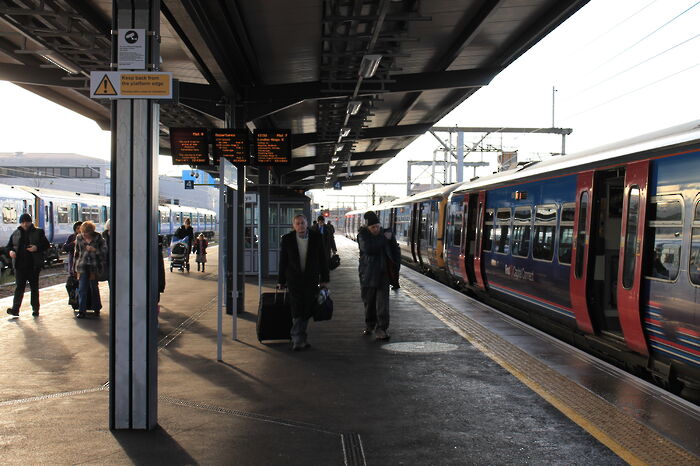Budget announces ‘ambitious’ infrastructure plans for Cambridge
Government releases plans for an “integrated programme of infrastructure, housing, business investment and development” in Cambridge – Milton Keynes – Oxford “brain belt”

The government’s 2017 Autumn Budget, released on Wednesday, includes “an ambitious integrated programme of infrastructure, housing, business investment and development” in the Cambridge – Milton Keynes – Oxford corridor. The programme comes less than a week after the National Infrastructure Commission released a report calling for such investment in the area.
Chaired by Labour peer Andrew Adonis, the commission called for the construction of several new towns to double the rate of housebuilding in the region. It also called for the acceleration of plans to build a rail link between Cambridge and Oxford, and proposed the construction of an expressway between the two cities.
The area, known as the “brain belt”, contributes significantly to the UK economy with its world-class universities and high concentration of high-tech and knowledge-based industries. That said, Lord Adonis stressed that its growth is hindered by “a lack of available homes and an infrastructure network that is feeling the strain”.
A report by the National Infrastructure Commission found that its proposed solutions to these problems have the potential to substantially increase economic output in the region. “Currently the area generates £90 billion per year towards the national economy. But by taking these steps this could increase to over £250 billion a year.”
Lord Adonis also stressed the need for cooperation between the national government and local leaders in order to turn these proposals into reality. He urged “local leaders to seize this opportunity and work together with Government, both for the benefit of their residents and of the country as a whole”.
James Palmer, the mayor of Cambridgeshire and Peterborough, echoed these sentiments: “The Greater Cambridge economy over the next decade is predicted to create approximately 44,000 new jobs, [sic] its [sic] only through the Government and local leaders working together collaboratively and in a creative way that we could put in place the housing and transport infrastructure to support this growth.”
More specifically to Cambridge, the plan also includes the construction of an additional train station near Addenbrooke’s hospital to the south of the city. This will partially be funded by £5 million grant from the government, which “is starting a study on the enhancements needed to accommodate future rail growth across Cambridgeshire.”
Such a rail link would also pass through numerous towns that have not yet been built. According to the plan, these would contain 1 million new homes by 2050 and would be the first new towns built in half a century. Such new towns would play a crucial role in alleviating Cambridge’s housing shortage.
According to Hometrack, Cambridge has the second-highest house prices in the UK, after London. Oxford is third. “The ratio of median house prices to earnings is 13:1 in Cambridge and 12:1 in Oxford making them two of the least affordable cities in the UK.” According to the report, this is a problem because “workers are being priced out of local housing markets, restricting firms’ access to labour and impacting on their competitiveness.”
Bridget Rosewell OBE, one of the commissioners of the National Infrastructure Commission, argued that the lack of affordable housing in Cambridge’s means that the city’s “long-term future is under threat”. The construction of new homes in nearby new towns should help alleviate this housing crisis, which could have a significant positive impact on Cambridge’s future.
The transportation links proposed in the report would also affect Cambridge by facilitating transportation to the other major cities in the “brain belt”. Currently, Oxford can only be reached by a 3-and-a-half hour coach ride or a train ride via London. If these transportation times could be cut, Cambridge could develop stronger economic connections with other cities in the region.
These transportation links would be built in parts, with a rail link between Bedford and Cambridge planned as the third and final phase. Plans for an expressway link between Cambridge and Milton Keynes is already underway, and will be expanded to Oxford later. The report calls for these links to be finished by 2030.
The ambitious vision laid out by the commission’s report was merely recommendation. Since it has been included in the national budget, however, this vision is now one that is endorsed by the government. The budget referenced the commission’s report numerous times and backs its conclusions and suggestions.
As a result, the next steps should include increased cooperation between national and local authorities to begin implementing the recommendations set forth in the report.
 News / Eight Cambridge researchers awarded €17m in ERC research grants27 December 2025
News / Eight Cambridge researchers awarded €17m in ERC research grants27 December 2025 News / Clare Hall spent over £500k opposing busway 24 December 2025
News / Clare Hall spent over £500k opposing busway 24 December 2025 Comment / League tables do more harm than good26 December 2025
Comment / League tables do more harm than good26 December 2025 Comment / The ‘class’ of Cambridge24 December 2025
Comment / The ‘class’ of Cambridge24 December 2025 News / Caius mourns its tree-mendous loss23 December 2025
News / Caius mourns its tree-mendous loss23 December 2025










